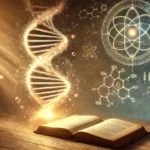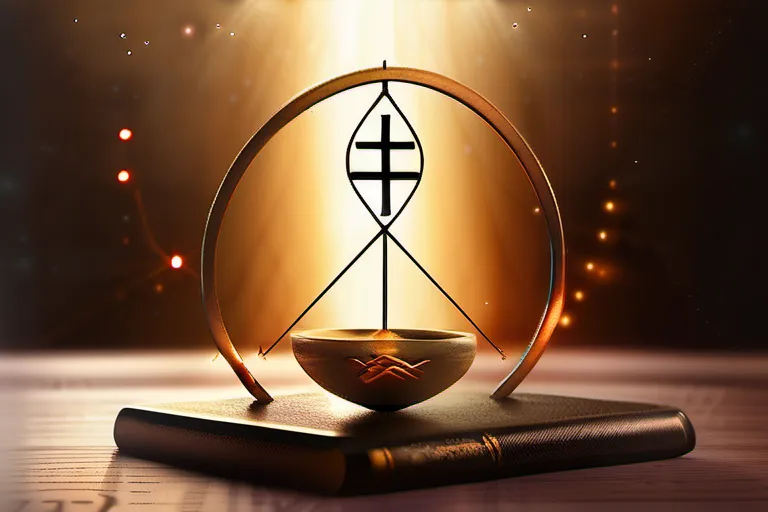Exploring the Intersection of Science, Faith, and Belief Systems
This article delves into the fascinating world where science and religion intersect. We’ll explore their historical relationship, key differences, similarities, and how they shape our understanding of the universe.
The Historical Evolution of Science and Religion
Imagine a vast, ever-expanding canvas; one that traces the historical journey of two giants—science and religion. From the ancient civilizations of Egypt and Greece to the enlightenment era and beyond, these disciplines have not only danced alongside each other but often intertwined in complex and intriguing ways.
Can you imagine how the early Greeks viewed both philosophy and astronomy as pursuits for understanding the divine? Plato’s allegory of the cave suggests that true knowledge comes from seeing reality directly. This mindset was deeply rooted in religious thought, where seeking truth about the universe and its creator was paramount.
As time marched on, the Middle Ages saw a period where church doctrine held sway over scientific inquiry. Yet, even then, the seeds of scientific thinking were planted. Thinkers like Roger Bacon argued for empirical methods, echoing the scientific method that would flourish centuries later.
The Renaissance was a turning point, marked by a revival of classical learning and a renewed emphasis on observation and experimentation. This period saw scientists like Galileo challenging religious doctrines about the nature of the cosmos. How could one reconcile an Earth-centered universe with biblical texts?
In recent times, the relationship has become more complex. While science continues to uncover the mysteries of the natural world, religion seeks to find meaning in human existence and beyond. Both continue to evolve, but their paths diverge in significant ways. How do these two giants approach knowledge, and what are the differences that separate them?
Key Differences Between Science and Religion
Have you ever wondered how science and religion navigate their paths, sometimes overlapping but often diverging? It’s like two rivers flowing through the same landscape yet taking different courses. One explores the physical world using empirical methods, while the other delves into spiritual and existential questions. Let’s explore these differences in detail to understand why they seem so distinct.
Firstly, let’s look at their methodologies. Science is driven by empiricism, relying on observation, experimentation, and logical reasoning. It aims to uncover the natural laws that govern our universe. In contrast, religion often operates based on faith, tradition, and revelation. While science can be skeptical of beliefs without empirical evidence, religion seeks answers beyond the material world.
The goals of these two disciplines are also quite different. Science strives for a deeper understanding of how things work, contributing to technological advancements that improve our lives. Religion, on the other hand, often focuses on providing comfort, meaning, and moral guidance. It explores questions about existence, purpose, and ethics—areas where science is less equipped to offer definitive answers.
When it comes to their areas of study, science examines the physical world through the lens of physics, biology, chemistry, and beyond. Religion, meanwhile, covers a vast array of topics, from theology and philosophy to cultural practices and spiritual experiences. While they overlap in some fundamental aspects—like exploring the nature of existence—they approach these questions from very different angles.
Understanding these distinctions helps us appreciate the unique contributions each makes. But it also highlights the importance of recognizing that science and religion are not mutually exclusive. They can coexist and complement each other, enriching our overall understanding of life’s complexities. By acknowledging their differences, we can foster a more inclusive dialogue between these two vital aspects of human knowledge.
Similarities Between Science and Religion
Imagine science and religion as two vast oceans, each with its own tides and currents, seemingly separate yet interconnected. Both embark on a quest to understand the world around us, but from different shores. In what ways do these disciplines share this pursuit of knowledge?
Firstly, both science and religion grapple with questions that are fundamental to our existence. Science seeks answers through empirical evidence and experimentation, while religion often turns to spiritual insights and divine revelation. Yet, isn’t it fascinating how they both aim for a deeper meaning in life? Could this be more than just a coincidence?
Consider the Big Bang theory in science, which has transformed our understanding of the universe’s origins. Similarly, religious texts often speak about creation stories that resonate with humanity’s quest to understand its place in the cosmos. Both narratives seek to explain where we come from and what our purpose might be.
The methodology in both fields also exhibits a curious parallel. Scientists use evidence, observation, and logical reasoning to build theories and models of how the world works. Religious scholars use scriptures, traditions, and personal experiences to interpret divine will or moral laws. Both approaches involve a rigorous search for truth, even if their methods differ significantly.
Moreover, both science and religion engage in a constant dialogue with society. Scientific discoveries challenge existing beliefs, just as religious teachings influence ethical standards and social behaviors. The interaction between these disciplines often leads to new insights and transformations in our understanding of the world.
In exploring similarities between science and religion, we uncover a rich tapestry of human inquiry that transcends boundaries. It challenges us to question what it means to seek knowledge, whether through empirical research or spiritual contemplation. This intersection invites us to consider how these two great pillars of human endeavor can coexist harmoniously in our quest for understanding and meaning.
The Role of Science in Challenging Religious Beliefs
Throughout history, scientific discoveries have served as a double-edged sword, challenging religious beliefs and sparking profound debates. Have you ever wondered how Copernicus’s heliocentric model upset the Earth-centric view held by many religions? Or pondered over Galileo’s struggles against the Church because his observations supported this new paradigm?
Scientific advancements have often pushed the boundaries of what was once considered divine truth, forcing believers to reevaluate their faith. For instance, Darwin’s theory of evolution challenged the biblical account of creation, prompting heated discussions about the origins of life and humanity’s place in nature.
The tension between science and religion is not just academic; it has real-world implications. Think about how the development of germ theory by scientists like Louis Pasteur and Robert Koch disrupted traditional beliefs about diseases being caused by evil spirits or curses, leading to significant improvements in public health but also causing conflicts with religious communities that held onto older explanations.
Moreover, as we delve into modern fields like genetics and cosmology, the gaps between scientific findings and religious narratives continue to widen. The Big Bang theory, for example, offers a compelling explanation of how the universe began, which some find difficult to reconcile with creationist views.
This clash is not merely about facts versus faith but also about interpretation and worldview. It raises important questions: Can science and religion coexist harmoniously? Or are they fundamentally at odds? The answers vary widely depending on individual perspectives, making the intersection of these domains a rich field for exploration and dialogue.
The Impact of Religion on Scientific Discovery
Imagine the mind of an early scientist, embarking on a journey to unravel the mysteries of nature. These pioneers were often deeply rooted in their religious beliefs, and it is fascinating to explore how these faiths influenced their scientific discoveries.
Religion as a Catalyst for Inquiry: How many times have we heard that the Church supported the work of Galileo? While it’s true that Galileo faced opposition from some sectors of the Catholic Church, his beliefs in the divine order and creation inspired him to delve into astronomy. His observations of the heavens were not just about gathering data but also understanding the grand design intended by God. This blend of faith and reason was common among early scientists like Galileo, Copernicus, and Kepler.
The Role of Faith in Methodology: The scientific method itself has roots that can be traced back to religious practices. Think about the meticulous observation and recording of natural phenomena—a practice reminiscent of the monastic tradition where monks meticulously documented their observations for centuries. These records served as a foundation for later scientists, showing how faith in accurate and systematic investigation could lead to groundbreaking discoveries.
A Sacred Text as Guidebook: Even today, some religious texts are used metaphorically by scientists to navigate ethical dilemmas in research. For instance, the concept of stewardship found in Christian theology is invoked when discussing environmental science. This idea that we should care for God’s creation influences how scientists approach issues like climate change and conservation.
It’s clear that religion has played a profound role in shaping both the direction and methodology of scientific inquiry. By examining these intersections, we gain a richer understanding not only of the past but also of the complex tapestry of modern science and faith.
So, as we move forward, how can we foster a dialogue where religious beliefs and scientific discoveries coexist harmoniously? The answer might lie in recognizing the shared goals of both disciplines—seeking truth and understanding. By embracing this intersection, we may find new pathways to explore together.
Navigating the Intersection of Science and Religion Today
Today, as we delve into the intersection of science and religion, one cannot help but wonder how these two seemingly disparate realms can coexist in harmony. How do we reconcile evolution, a cornerstone of modern biology, with creationist beliefs that often find their roots in religious texts? Is there any common ground between them, or are they destined to clash like oil and water?
The debate over evolution vs. creationism is not just about scientific facts but also reflects deeper questions about the nature of existence and purpose. Imagine a vast library where every book represents a belief system—some claim the universe was created in an instant, while others propose it emerged through countless cosmic epochs. How do we navigate this labyrinth without losing our way?
Moreover, the search for extraterrestrial life introduces another layer to the discussion. If we discover intelligent beings elsewhere in the cosmos, would that challenge or confirm religious beliefs? Would it imply a single creator, multiple creators, or none at all? The idea of searching for aliens can be likened to exploring a dark attic; what we find might change everything.
In both evolution and extraterrestrial life searches, science often operates like a light in the darkness, illuminating possibilities that challenge our preconceptions. But religion provides the context of meaning and morality around these findings. How do we balance this delicate scale? Are we looking for confirmation or contradiction?
Conclusion
 By the end of this article, you’ll have a deeper appreciation for the complex relationship between science and religion, and a better understanding of how these two powerful forces influence our worldview.
By the end of this article, you’ll have a deeper appreciation for the complex relationship between science and religion, and a better understanding of how these two powerful forces influence our worldview.











